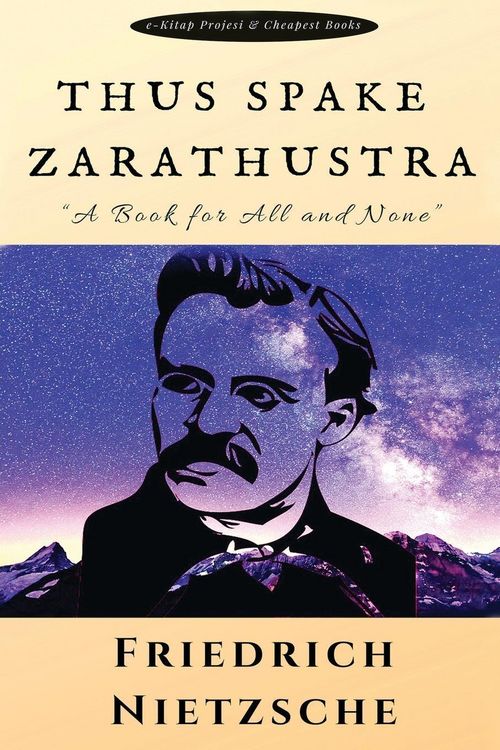
Thus Spake Zarathustra "A Book for All and None"
-
- Hardcover
- Taschenbuch ausgewählt
- eBook
- Hörbuch
-
Sprache:Englisch
-
Verlag:E-Kitap Projesi & Cheapest Books
- John Wiley & Sons 14,99 €
- Prometheus 17,99 €
- Henricus - Edition Deutsche Klassik GmbH, Berlin 9,80 €
- Wilder Publications 19,99 €
- E-Kitap Projesi & Cheapest Books 23,99 € ausgewählt
- Penguin Books USA 17,99 €
- Oxford University Press 13,99 €
- Prakash Books 8,99 €
- Neeland Media 16,99 €
- Owl's Nest Publishers, LLC 16,99 €
- Oxford Academic 12,99 €
- Simon & Brown 19,99 €
- Union Square & Co. 11,99 €
- Wordsworth 7,99 €
- Dover Publications 11,99 €
- Aziloth Books 19,99 €
- E-artnow 13,90 €
- Notting Hill Editions 16,99 €
- Penguin Books Ltd 12,29 €
- Gröls Verlag 14,90 €
23,99 €
inkl. MwSt,
Lieferung nach Hause
Beschreibung
Details
Einband
Taschenbuch
Verlag
E-Kitap Projesi & Cheapest BooksSeitenzahl
344
Maße (L/B/H)
23,4/15,6/1,9 cm
Gewicht
586 g
Übersetzt von
Thomas Common
Sprache
Englisch
EAN
9786057876485
Described by Nietzsche himself as "The Deepest Ever Written", the book is a dense and esoteric treatise on philosophy and morality, featuring as protagonist a fictionalized Zarathustra. A central irony of the text is that the style of the Bible is used by Nietzsche to present ideas of his which fundamentally oppose Judaeo-Christian morality and tradition.
Thus Spoke Zarathustra was conceived while Nietzsche was writing The Gay Science; he made a small note, reading "6,000 feet beyond man and time," as evidence of this. More specifically, this note related to the concept of the eternal recurrence, which is, by Nietzsche's admission, the central idea of Zarathustra; this idea occurred to him by a "Pyramidal Block of Stone" on the shores of Lake Silvaplana in the Upper Engadine, a high alpine region whose valley floor is at 6,000 feet (1,800 m). Nietzsche planned to write the book in three parts over several years. He wrote that the ideas for Zarathustra first came to him while walking on two roads surrounding Rapallo, according to Elisabeth Forster.
Unsere Kundinnen und Kunden meinen
Verfassen Sie die erste Bewertung zu diesem Artikel
Helfen Sie anderen Kund*innen durch Ihre Meinung
Kurze Frage zu unserer Seite
Vielen Dank für dein Feedback
Wir nutzen dein Feedback, um unsere Produktseiten zu verbessern. Bitte habe Verständnis, dass wir dir keine Rückmeldung geben können. Falls du Kontakt mit uns aufnehmen möchtest, kannst du dich aber gerne an unseren Kund*innenservice wenden.
zum Kundenservice